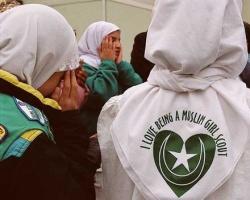Sometimes when Asma Haidara, a 12-year-old Somali immigrant, wants to shop at Target or ride the Minneapolis light-rail system, she puts her Girl Scout sash over her everyday clothes, which usually includes a long skirt worn over pants as well as a swirling head scarf. She has discovered the trademark green sash — with its American flag, troop number, and colorful merit badges — reduces the number of glowering looks she draws from people otherwise bothered by her traditional Muslim dress.
“When you say you are a Girl Scout, they say, ‘Oh, my daughter is a Girl Scout, too,’ and then they don’t think of you as a person from another planet,” said Asma, a slight, serious girl with a bright smile. “They are more comfortable about sitting next to me on the train.”
Scattered Muslim communities across the United States are forming Girl Scout troops as a sort of assimilation tool to help girls, who often feel alienated from the mainstream culture, and to give Muslims a neighborly aura. Boy Scout troops are organized with the same inspiration, but often the leap for girls is greater because many come from conservative cultures that frown upon them participating in public physical activity.
By teaching girls to roast hot dogs or fix a flat bicycle tire, Farheen Hakeem, one troop leader, strives to help them escape the perception of many non-Muslims that they are different. Scouting is a way of celebrating being American without being any less Muslim, Ms. Hakeem said.
The Girl Scouts’ national organization, Girl Scouts of the U.S.A., has become flexible in recent years about the old trappings associated with suburban, white, middle-class Christian Scouting. Many troops have done away with traditions, like saying grace before dinner at camp, and even the Girl Scout Promise can be retooled as needed.
“On my honor I will try to serve Allah and my country, to help people and live by the Girl Scout Law,” eight girls from predominantly Muslim Troop 3119 in Minneapolis recited on one recent rainy Sunday before setting off for a cookout in a local park.
Some differences were readily apparent, of course. At the cookout, Hakeem, negotiated briefly with one sixth grader, Asha Gardaad, who was fasting for the holy month of Ramadan.
“If you break your fast, will your mother get mad at me?” Hakeem asked. Asha shook her head emphatically no.
The troop leader distributed supplies: hot dogs followed by S’mores for dessert. All was halal — that is, in adherence with the dietary requirements of Islamic law — with the hot dogs made of beef rather than pork.
It was Asha’s first S’more. “It’s delicious!” she exclaimed, licking sticky goop off her fingers as thunder crashed outside the park shelter with its roaring fire. “It’s a good way to break my fast!”
Women trying to organize Girl Scout troops in Muslim communities often face resistance from parents, particularly immigrants from an Islamic culture like that of Somalia, where tradition dictates that girls do housework after school.
In Nashville, where Ellisha King of Catholic Charities helps run a Girl Scout troop on a shoestring to assist Somali children with acculturation, most parents vetoed a camping trip, for example. They figured years spent as refugees in tents was enough camping, King recalled.




